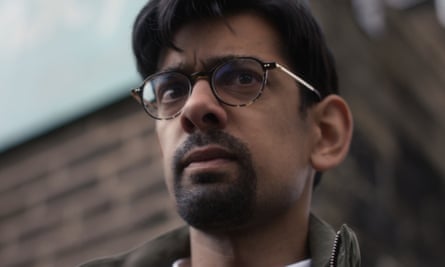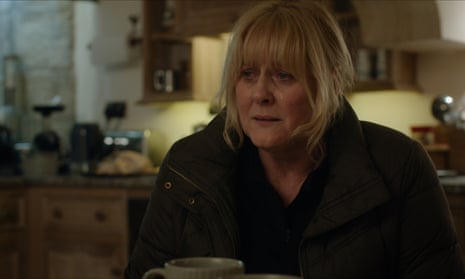Brutal, tender, funny, compelling and heartbreaking to the last – there is nothing left to do now but look back on Happy Valley and bid all its denizens and their creator an awed farewell.
After three seasons, Sally Wainwright has concluded one of the greatest trilogies in modern television. She always planned to tell her bereaved protagonist’s story in three parts; you feel that even if she hadn’t felt like keeping her word, Catherine Cawood herself would have stepped in and made sure she did.
Catherine (Sarah Lancashire), of course, is the centre of Happy Valley’s dramatic universe. The partnership between Lancashire (who inhabits the role so fully that it is impossible to imagine anyone else in it) and Wainwright is drama’s equivalent of Victoria Wood and Julie Walters. Separately, they are brilliant. Together, they are invincible.
In her professional capacity, Sgt Cawood knows every bad ’un (generally “twats”, sometimes “shitpots”), good ’un and doing-their-best ’un in the Calder Valley. Outside work, she is a sister to a recovering alcoholic, Clare (Siobhan Finneran), the former wife of Richard (Derek Riddell), a mother of two and a grandmother of one. She is also a woman who will go to her grave mourning the loss 16 years ago of her 18-year-old daughter, Becky, who died by suicide after being raped and impregnated by the shitpot of shitpots, Tommy Lee Royce (James Norton). We have spent three seasons seeing Catherine wrestle with that grief, watching her try not to be consumed by her hatred of Tommy and to find her way through the fear, love, worry and resentment that were an inescapable part of raising Ryan, the baby Becky left behind.

The penultimate episode left a general sense of there being an awful lot – possibly too much – to do in the finale, even with an extended running time of 70 minutes. Tommy had escaped from prison and made contact with Ryan (Rhys Connah), encouraging him to run away with him to Spain. Catherine and Clare’s relationship had been sundered seemingly irreparably by the deepest betrayal.
There was nothing yet allowing the police to connect Faisal (Amit Shah) to the murder of Joanna (Mollie Winnard); although most viewers would have been happy to see her abusive husband, Rob (Mark Stanley), go down for it, that didn’t seem to fit with the arc of Wainwright’s moral universe. The nailing of Halifax’s answer to the Sopranos, the drug-running Knezevics, also seemed a long way off. A showdown between Catherine and Tommy was surely coming, but how – and who, if anyone, would survive it – was up for grabs.
after newsletter promotion
“Don’t doubt Wainwright” was the lesson of the finale. As surefooted as any fell-walker – and aided by a cast without a weak link – she took us through to neat but truthful resolutions to every part of the story. It had redemption, justice, bitter laughs and fire in its blood.
Wainwright works her plots beautifully, and yet Happy Valley’s greatness lies elsewhere. It lies in the compassionate portrait of Clare as someone too kind and too weak to do no harm. It lies in the pin-sharp depictions of all the forms of aggression and violence women meet from men throughout their lives. It lies in the bone-deep weariness of Catherine – be she levering herself off the sofa when the secretary tells her the chief constable is going to be half an hour late for their meeting (“I’ve got stuff to be doing”), running another colleague through how to do their job properly, or closing her eyes for a moment before a drink of tea.
It is in the brief, desperate banging of her head against a shop window when an image of Becky floats before her and she has to knock sense into herself. It lies in her stopping to make sure Ryan’s tea won’t spoil while she is tearing him off a strip. It lies in Catherine and Wainwright’s profoundly, unreservedly, unapologetically northern, middle-aged, female point of view – the point of view of people in charge of clearing up all the mess that twats leave behind as they make their careless way though life.
And now it is over. Farewell, then, to our magnificent valley girl. Let’s hope Catherine finally gets some peace where she is going.

Comments (…)
Sign in or create your Guardian account to join the discussion